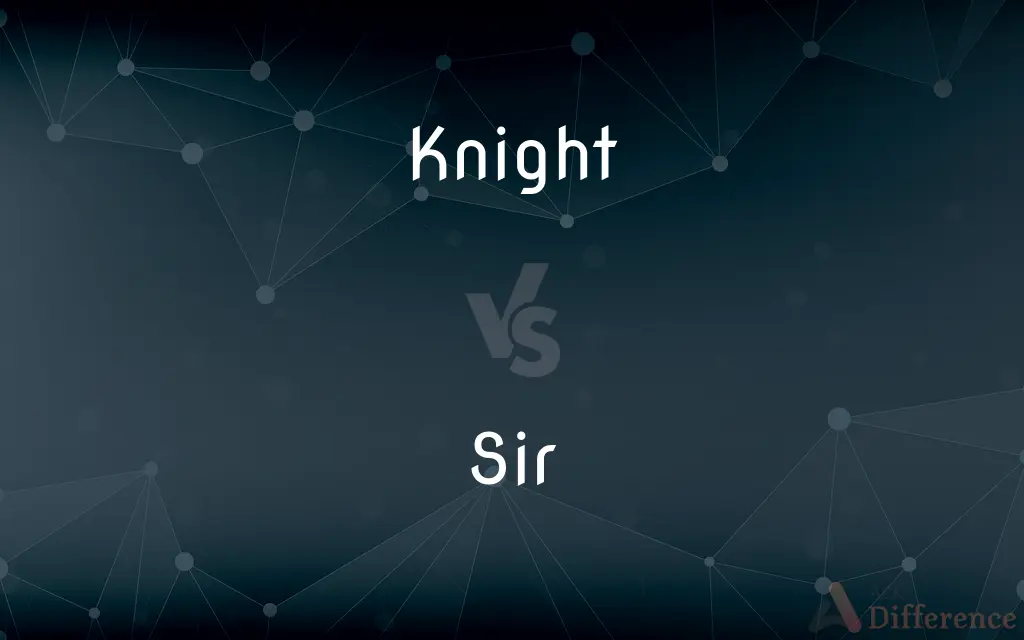Knight vs. Sir — What's the Difference?

Difference Between Knight and Sir
ADVERTISEMENT
Compare with Definitions
Knight
A knight is a person granted an honorary title of knighthood by a head of state (including the pope) or representative for service to the monarch, the church or the country, especially in a military capacity.Knighthood finds origins in the Greek hippeis and hoplite (ἱππεῖς) and Roman eques and centurion of classical antiquity.In the Early Middle Ages in Europe, knighthood was conferred upon mounted warriors. During the High Middle Ages, knighthood was considered a class of lower nobility.
Sir
Sir is a formal English honourific address for men, derived from Sire in the High Middle Ages. Traditionally, as governed by law and custom, "Sir" is used for men titled as knights, i.e., of orders of chivalry, and later also applied to baronets and other offices.
Knight
A medieval tenant giving military service as a mounted man-at-arms to a feudal landholder.
Sir
Sir Used as an honorific before the given name or the full name of baronets and knights.
Knight
A medieval gentleman-soldier, usually high-born, raised by a sovereign to privileged military status after training as a page and squire.
ADVERTISEMENT
Sir
Used as a form of polite address for a man
Don't forget your hat, sir.
Knight
A man holding a nonhereditary title conferred by a sovereign in recognition of personal merit or service to the country.
Sir
Used as a salutation in a letter
Dear Sir or Madam.
Knight
A man belonging to an order or brotherhood.
Sir
A man of a higher rank or position.
Knight
A defender, champion, or zealous upholder of a cause or principle.
Sir
A respectful term of address to a man of higher rank or position, particularly:
Knight
The devoted champion of a lady.
Sir
To a knight or other low member of the peerage.
Just be careful. He gets whingy now if you don't address him as Sir John.
Knight
Abbr. Kt or N(Games) A chess piece, usually in the shape of a horse's head, that can be moved two squares along a rank and one along a file or two squares along a file and one along a rank. The knight is the only piece that can jump other pieces to land on an open square.
Sir
To a superior military officer.
Sir, yes sir.
Knight
To raise (a person) to knighthood.
Sir
To a teacher.
Here's my report, sir.
Knight
(historical) A young servant or follower; a trained military attendant in service of a lord.
Sir
A respectful term of address to an adult male (often older), especially if his name or proper title is unknown.
Excuse me, sir, do you know the way to the art museum?
Knight
(historical) A minor nobleman with an honourable military rank who had served as a page and squire.
Sir
To address (someone) using "sir".
Sir, yes, sir!
Don't you sir me, private! I work for a living!
Don't you sir me, private! I work for a living!
Knight
(by extension) An armored and mounted warrior of the Middle Ages.
King Arthur and the Knights of the Round Table
Sir
A man of social authority and dignity; a lord; a master; a gentleman; - in this sense usually spelled sire.
He was crowned lord and sire.
In the election of a sir so rare.
Knight
A person obliged to provide knight service in exchange for maintenance of an estate held in knight's fee.
Sir
A title prefixed to the Christian name of a knight or a baronet.
Sir Horace Vere, his brother, was the principal in the active part.
Knight
(modern) A person on whom a knighthood has been conferred by a monarch.
Sir
An English rendering of the LAtin Dominus, the academical title of a bachelor of arts; - formerly colloquially, and sometimes contemptuously, applied to the clergy.
Instead of a faithful and painful teacher, they hire a Sir John, which hath better skill in playing at tables, or in keeping of a garden, than in God's word.
Knight
(literary) A brave, chivalrous and honorable man devoted to a noble cause or love interest.
Sir
A respectful title, used in addressing a man, without being prefixed to his name; - used especially in speaking to elders or superiors; sometimes, also, used in the way of emphatic formality.
Knight
(chess) A chess piece, often in the shape of a horse's head, that is moved two squares in one direction and one at right angles to that direction in a single move, leaping over any intervening pieces.
Sir
Term of address for a man
Knight
A playing card bearing the figure of a knight; the knave or jack.
Sir
A title used before the name of knight or baronet
Knight
(entomology) Any of various nymphalid butterflies of the genus Ypthima.
Knight
(modern) Any mushroom belonging to genus Tricholoma.
Knight
(transitive) To confer knighthood upon.
The king knighted the young squire.
Knight
To promote (a pawn) to a knight.
Knight
A young servant or follower; a military attendant.
Knight
In feudal times, a man-at-arms serving on horseback and admitted to a certain military rank with special ceremonies, including an oath to protect the distressed, maintain the right, and live a stainless life.
Knights, by their oaths, should right poor ladies' harms.
Knight
A piece used in the game of chess, usually bearing a horse's head.
Knight
A playing card bearing the figure of a knight; the knave or jack.
Knight
To dub or create (one) a knight; - done in England by the sovereign only, who taps the kneeling candidate with a sword, saying: Rise, Sir --.
A soldier, by the honor-giving handOf CŒur-de-Lion knighted in the field.
Knight
Originally a person of noble birth trained to arms and chivalry; today in Great Britain a person honored by the sovereign for personal merit
Knight
A chessman in the shape of a horse's head; can move two squares horizontally and one vertically (or vice versa)
Knight
Raise (someone) to knighthood;
The Beatles were knighted
Share Your Discovery

Previous Comparison
Wisdom vs. Prudence
Next Comparison
Smartphone vs. Calculator













































